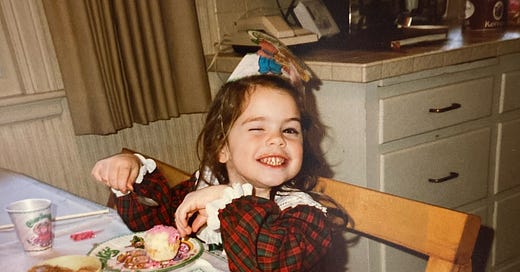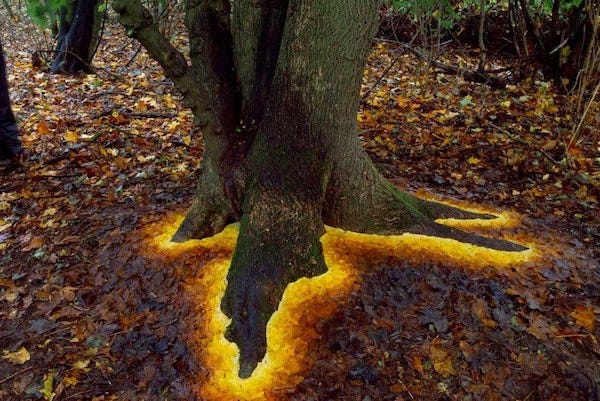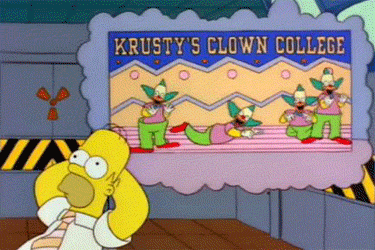On Friday the 13th of January this year, not ten days after turning 40, I spent an appropriately nightmarish five hours in a neuropsychological evaluation. Two weeks later, feeling like death because Covid had finally got me, I got my diagnoses. ADHD and Social Anxiety Disorder. Couple that with a therapy session that revealed that I probably also have sensory processing sensitivity, and I got a doozy of a 40th birthday present.
I’ve been working on writing this for a long time, partly because, well, I have ADHD and getting things done isn’t my strong suit. But also, all these months later, it still feels sorta cringey to share and I’m still processing my feels. It’s validating in some ways. I’ve always felt like I was a bit weird. Turns out…. yep, certifiable! Now I better understand why I struggle with certain things, why I sometimes operate in ways that seem quite different than other people. And the diagnosis is helping me embrace the weird parts of me, rather than viewing them as personal failings to be fixed.
But, it’s also frustrating to only just learn about this as a grown up looking for answers to why I find adulting so overwhelming (beyond the obvious answer: the capitalist hellscape we live in). And having a diagnosis doesn’t make the challenges of these things go away.
I have a lot of thoughts on all this, but in this post, which is already way too long, I’ll focus on the basics of these diagnoses and give you a glimpse into this neurodivergent gal’s brain. Yikes. But maybe it’s helpful to understand how different brains process things differently. And maybe another weirdo out there will feel seen.
I’ll start with explaining sensory processing sensitivity (SPS). It’s a heightened awareness and deeper cognitive processing of environmental (including physical, social, and emotional) stimuli. No, this doesn’t mean I’m sooo deep, it just has to do with what my brain does with the information it takes in, and it’s mostly subconscious. I likely fall in the approximately 20% of the population who are “highly sensitive persons” or HSPs. It’s common enough that it’s not considered a disorder, but since most people don’t have it, it’s still not very well understood.
It’s an innate trait that’s been observed in over 100 different species of animals, so likely has evolutionary advantages. Like what? Well, noticing where the good patch of food is when others don’t! Yum! Or being the first to notice danger! Um, yay? (Explains why I’ve cared desperately about climate change for more than 30 years. Fun.)
According to research, HSPs often have big imaginations and a rich interior life, which is why we’re usually very happy alone. And we tend to be pretty empathetic and easily and deeply moved by nature, art, and music. It always blows my mind to meet people who’ve never had a sculpture take their breath away (I’ll love you forever, Andy Goldsworthy) or don’t put headphones on and get lost in every note and percussive thrum of a song, or aren’t moved beyond words by the magic of a seed or a hundred-year-old oak. What a bummer it must be to go through life not being constantly awed by things.
But, being an HSP also comes with disadvantages, mainly, we overwhelm easily. Remember this piece I wrote about self-soothing? I didn’t know any of this then, but man does it make even more sense now. HSPs can be extra reactive to loud or sudden sounds, bright lights, noise, and/or busy environments and we have a hard time tuning out stimulation. We tire easily and need A LOT more downtime and alone time than the average person. We’re mostly introverts. I know intimately how sensory overwhelm can make it hard to engage socially. Put me in a party or loud, crowded place and my brain fries. I might feel frantic or have a hard time carrying on a conversation or keeping track of my thoughts.
That said, I’ve gotten pretty good at faking it when I need to (when neurodivergent folks fake it for the sake of being perceived as normal and not making others uncomfortable it’s called “masking”). But even now, with years of practice, I still hit overload pretty quickly in highly stimulating situations. Afterward, my mind races and it takes hours for my nervous system to calm down . And it was only this year that I learned that this isn’t how all introverted people experience life.
I’ve always admonished myself for not liking many things I’ve been told are “fun.” But now I realize it’s not a personality flaw that I generally don’t want to hang out with people after 8pm (lol, but it’s true). Now I feel more comfortable saying no to things when I want to. No… what a glorious word!
So, next up is the social anxiety disorder diagnosis. Part of me was like, yeah, this is some real “water is wet” information. I didn’t need to spend five hours being tortured with brain teasers while someone watched me squirm uncomfortably to learn this. Except, while it was true - and acutely so - for the vast majority of my life, now I feel much less shyness. Huzzah! But much more generalized anxiety. Womp womp. And that’s mostly thanks to having kids (love ya, kiddos!). And also climate change. Oh, and pandemics.
Anxiety (social or otherwise) is often linked with both ADHD and being an HSP. But in our society, I think we’re also quick to pathologize introversion or other traits that don’t line up with cultural ideals . Our culture far prefers extroversion, so of course how I show up is “problematic.” I mentioned in my evaluation that I sometimes feel imposter syndrome in work situations, and that seems like it was important to the social anxiety diagnosis. But, here’s the thing about imposter syndrome that I’d like to have told my white male psychologist — and I’m not the first person to say this — when you live in an exceptionally hierarchical society like ours and you hold any type of identity that is marginalized, you’re often told in no uncertain terms that you don’t belong in the workplace, no matter your degrees or accomplishments. As if all the micro and macro aggressions that tell us we’re outsiders isn’t enough, we’re also literally paid less than our white, male, “ideal worker” counterparts.
So, is it really imposter syndrome, or is it patriarchal-capitalist-white supremacy? Am I the one with the pathology, or is it a sick culture? I have a lot of thoughts about the failings of our hyper-individualist modes of western therapy and psychology within a culture and systems designed to make us unwell… but that’s another post.
Then there’s the ADHD diagnosis. This one’s probably a shock to people who know me. But, I’m actually a classic case. For women and girls, the hyperactivity tends to be mental. My brain is a goddamn circus most of the time. I’m very easily distracted. As a kid, I was very quiet and often lost in thought, and might have struggled in school, except I’m reasonably intelligent and the social anxiety kept me focused on the teacher out of the intense fear of being called on.
Some women with ADHD tend to overcompensate for our unruly brains and work extra hard, and may become perfectionists and/or high achieving. Like many ADHDers, I’m interested in a million things and every week have a new hobby or topic I’m researching, only to eventually move on to the next thing. I’m truly a jack of all trades, master of none. Which also very much explains why I’m an underachieving overachiever, as I’ve described myself before. Our society likes specialists because we know how to monetize them, not autodidactic polymath weirdos.
I struggle to finish, or sometimes even start anything complicated, long-term, or with a lot of steps. Everything takes me way longer to get done than I expect. And if there’s no external accountability (school or job), it may well never get done. It’s not that I’m especially motivated by a grade or paycheck, it’s that I really don’t want to make an ass of myself in front of a teacher or boss. Oh, hi social anxiety… I didn’t see you there!
But every now and then, I hit moments of hyperfocus. Then I’ve suddenly been gardening for 4 hours (but somehow, still haven’t made a dent in the weeds?) or writing for 3 hours, and I’m way past bedtime or running out the door to get the kids.
I recently learned about ADHD and justice sensitivity — some folks with ADHD (particularly my type: inattentive) have very strong emotional reactions to social injustice and tend to get involved in lots of causes or get really fired up about things. So on brand, amiright?! For anyone who’s spent more than five minutes with me and knows firsthand that I’m a world-class party-pooper, hyper-fixated on basically every global problem, well… sorry not sorry.
Turns out, I’m part of a trend. There’s been a big increase in adult women being diagnosed with ADHD in recent years. Many of us fly under the radar and manage, until we can’t. Adulthood brings cognitive demands that outstrip our ability to cope — jobs, homes, partners, kids, bills, etc. You get it. Throw in a pandemic that scrambled just about everyone’s brain, and here we are… in an Adderall shortage.
Speaking of Adderall, you might be wondering if I’m taking the wonder-stimulant. I’m not. My doctor prescribed Wellbutrin, an off-label treatment for ADHD. It’s not a stimulant, it’s a norepinephrine-dopamine reuptake inhibitor (ADHD is a dopamine deficiency). It has fewer side effects than a stimulant, is non-habit forming, and importantly, is accessible, since the Adderall shortage is showing no signs of ending. So far, it seems to have improved my executive functioning somewhat (so, like, I might open a piece of mail now instead of 3 months from now), but I’m not sure it’s done anything for that elusive unicorn — focus.

All things considered, my ADHD is pretty mild. But, the cognitive demands of being a grownup often make me feel like I’m drowning (relatable, right?). And the fact that I really struggle to finish my creative projects is the thing that most frustrates me. My laptop is littered with books I’ve started writing, made it a quarter of the way through, then abandoned. I think I’ve got at least four of them I’ve attempted to work on over the years. I guess if I just smash them all together, there’s my book.
I look back now and feel some sadness for that kid who was always trying so hard to figure out how to be normal enough to get by, but also be herself. That kid who had all those stomachaches and headaches (that turned into full blown migraines in law school, which makes SO MUCH SENSE now) from anxiety and sheer mental exhaustion. I mean, I still get lots of headaches and am sort of always tired. Lol sob. But, at least I’m more comfortable with myself now.
And I appreciate now how intuitive I was as a kid, how I figured out my own coping mechanisms and took care of myself, mostly by hanging out in the woods as much as I could (nature is a highly effective ADHD therapy, and just generally one of the best ways to soothe a frazzled brain, which probably explains why living in an urban environment has been hard for me). My many obsessions also helped. I taught myself yoga in high school. I read books on Buddhism and meditation in middle school (nerd alert! Also, goodbye and good riddance Catholic Church!). I’ve been obsessed with art, music, and stories for as long as I can remember. And stargazing was (and remains) one of my most cherished hobbies/self-soothing activities. I took out H.A. Rey’s Find the Constellations from the library in third grade and never looked back.
And honestly, I really love my brain. It’s super interesting in there. The beauty of ADHD is that you have an insatiable curiosity and your brain makes all kinds of surprising connections. When you’re interested in a million things, it makes for big, interesting thoughts. As an ADHDer, I’m by nature a nonconformist. And thank god. Conforming is painfully boring. I’m starting to see my quirky, sensitive, and wild brain as a gift, and that’s thanks to finally getting a diagnosis and understanding it a little bit better. At the ripe old age of 40.








Wow! I just found you, and welcome to the Wellbutrin club. At 73, diagnosed over 30 years ago, and on Bupropion as long, I’m really happy to finally have an explanation for my lifelong injustice sensitivity. I could say so much more here, but I have a long list of to-dos and need to get at them. Thank you for your transparency. It’s helping this old girl with inattentive type feel a little less odd and alone as I progress through your Substack posts from their beginning. (My ADHD is a somewhat augmented by mild Autism, so AuDHD is more accurate and adds an obsessive compulsive piece when life allows.)